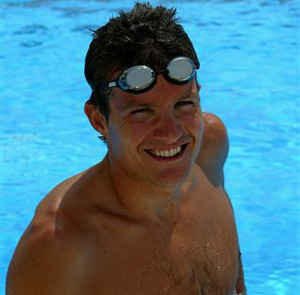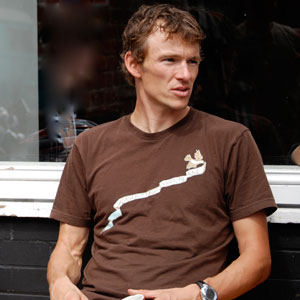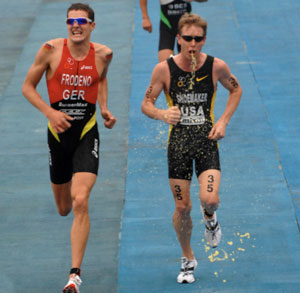Upstart Frodeno outkicks the Whitfield Time Machine to snatch Olympic Gold
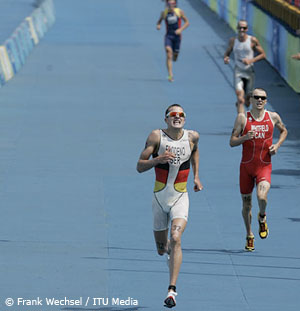
When all the shouting at Shinsanling Reservoir was over, a surprise longshot German outkicked a triathlon murderer's row to take gold in the Olympic men’s triathlon. After a tense, race-long duel, Cologne's Jan Frodeno sped past the greatest runners in the sport in the last few yards to earn the winner's wreath.
Hitting the line in 1:48:53, Frodeno won by five seconds over silver medalist Simon Whitfield of Canada, while Bevan Docherty of New Zealand took the bronze 7 seconds later.
A year ago, this very same Jan Frodeno was racing down the finishing chute in Beijing for far humbler goals. He had to accelerate ahead of U.S. triathlete Jarrod Shoemaker to take 10th place in the 2007 Olympic preview World Cup – and to escape Shoemaker’s last-second projectile vomiting.
On Tuesday, a day after his 27th birthday, Frodeno was in more rarefied company – the unknown triathlete in a high caliber four-man duel for Olympic gold. With 500 meters to go, he was running in a tight pack with current World Champion Javier Gomez of Spain, 2004 World Champion and Olympic silver medalist Bevan Docherty of New Zealand, and the legendary 2000 Olympic gold medalist Simon Whitfield of Canada.
But just before noon Tuesday, the carefree 27-year-old German who lists surfing as his favorite pastime, was the coolest man on a hot medal chase in the Ming Tombs Reservoir near Beijing. "I just tried to focus and not read their names," recalled Frodeno.
While most young athletes without a single career win might have been satisfied with a front row seat at Olympic history, Frodeno wanted more.
"I knew the medal was safe," he told the Associated Press. "But I tried to get the gold. I kept thinking that this was the moment I've been dreaming of. I could hear the other guys breathing and I just sprinted."
In the final kilometer, shockingly, Gomez was the first to weaken. While he looked like he was clutching his side to rub out a side stitch, it was a leg that failed him. "My tendon was really bothering me," Gomez told the AP, "And I know in the last kilometer I was dead."
With just 500 yards to go, and two-time ITU World Cup series champion Gomez broken and current World Championship silver medalist Docherty out of gas, it came down to a duel between Whitfield – a man who has won 11 World Cups – and Frodeno – a young man who has garnered several podiums but has never won a major race.
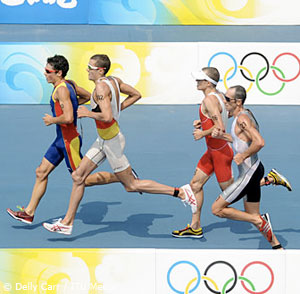
Whitfield, who had repeatedly lagged up to 15 meters behind the tightly bunched lead pack in the final two laps of the run, revved up the magic motor that brought him to Olympic gold eight years ago. With one big surge, he erased the 15 meter deficit with 500 meters to go. Taking only enough time to catch a breath, he ran on Frodeno’s elbow, waiting to attack. Finally, approaching the final turnaround at the far end of the blue carpeted finish line straight, Whitfield jumped in the time machine and tried to summon 2000 all over again.
"I always believe that you go so early that it just takes pure will power to go with you," said Whitfield. As it turns out, Whitfield was 33, not 25, and Frodeno, who was 27 and just coming into his powers, had the will and the power to stay with him.
With 200 yards to go Frodeno, who took a back seat to countryman Daniel Unger’s miraculous come-from-behind win at the 2007 ITU World Championships, took center stage.
Unger who electrified his countrymen with his amazing home town win in Hamburg a year ago, was playing a supporting role 200 meters back and headed for an honorable sixth place. Just the spot Frodeno finished in Hamburg when Unger took gold.
Putting his 6-foot 4-inch, 165-pound frame into high gear, just one inch shorter and a few mph slower than Jamaican Olympic sprint sensation Usain Bolt, Frodeno blew away the Canadian’s last hopes of a repeat Olympic gold. But the moment wasn’t seized by blind luck and youthful power alone. Frodeno timed his move with hard-won knowledge gained in a series of heartbreaking almosts.
"I lost so many sprints this year," Frodeno told Scripps Howard newspapers. "In every race I went to, I lost in a sprint to the finish. What it teaches you is you have to pace yourself and wait for the right moment to go. When I saw Simon take off, I knew that there were 500 meters left. I had practiced all of this in my mind over and over. Simon is a fast guy, but I think he went a little bit early. I actually thought he'd come back to me. But I just focused myself on looking forward, never turning back."
When Frodeno went by like a freight train with 80 meters to go, all the air went out of Whitfield. He looked around and saw Docherty was well back, also in surrender mode, and so he trotted in for the silver.
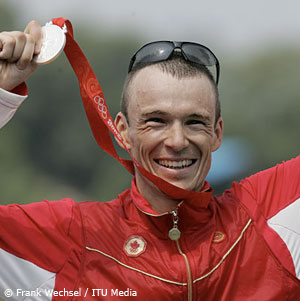
Whitfield, a consummate sportsman, smiled at the finish and told Canada’s National Post: "I gave everything I had, and Jan just kept coming. What a spectacular performance!"
While Frodeno was a surprise first time winner, his recent performances gave a clear signal he was ready for a breakthrough.
At the July ITU World Cup in Hamburg, Frodeno finished second, out-sprinted and five seconds back of Daniel Unger with a second-best 30:39 finishing 10km – seven seconds faster than he would run at Beijing. At the Tongyeong World Cup in April, Frodeno finished third behind famed runners and champions Tim Don and Bevan Docherty, with another world-class run of 30:36.
Knowing he was beaten, Whitfield trotted in for silver while Frodeno blasted through the tape with a race-best 30:46 10km and a 5-second margin of victory in 1:48:53.
Pointing out the evolution of the sport, Whitfield's revolutionary 30:52 final 10km in 2000 was six seconds slower than Frodeno's mad dash. In fact, Whitfield ran four seconds faster Tuesday – but his jet propelled close only brought him silver this time out.
Physically spent but earning an honorable bronze after losing the duel was Docherty, 12 seconds back of the winner after running a third-best 30:57.
Looking downcast was the pre race favorite, 10-time World Cup winner and 2007 Beijing World Cup champion Javier Gomez of Spain, who arrived at the finish in the cruelest Olympic placing. Gomez was fourth and out of the medals, 20 seconds back of Frodeno. Stuck in the high-adrenaline four man duel, Gomez was unable to make his usual surge halfway through the run. When his usually successful negative split long push didn't work, Gomez came to the last lap shootout like a gunslinger with a slingshot.
Looking much more satisfied, 2002 ITU World champion Ivan Rana, who has been eclipsed by his younger countryman for the past few years, dueled with the four until a mile to go and finished a strong fifth, 8 seconds back of Gomez.
Unger, thrilled for his frequent training partner and good friend Frodeno, took 6th, 50 seconds behind the gold.
Given his long road back from a 2007 sacroiliac injury that threatened his career and a February hernia that turned a seemingly sure Olympic qualification into a razor thin nail biter, three-time American Olympian Hunter Kemper finished his race off with a 31:40 10km to take 7th place – 5 seconds back of Unger. While he's futily dreamed of a medal in the Olympics or World Championships for all his career, Kemper was happy with his 17th to 9th to 7th Olympic progression — given the circumstances. From the smile on his face, you could tell that Kemper was proud of his best-ever Olympic finish.
"I did all I could," Kemper told the Tribune Newspapers. "I kept trying to pick people off, but no more would come back. Not everyone can get to the podium."
Jarrod Shoemaker kept his breakfast down and finished 18th, 1:53 back of Frodeno and ahead of such luminaries as 2000 ITU World Champion Olivier Marceau (19th), 2004 Olympic bronze medalist Sven Riederer (23rd), two-time ITU World Championship medalist Reto Hug (29th) top New Zealander Kris Gemmell (39th) and 2006 ITU World Champion Tim Don (DNF).
The USA's Matt Reed had a very disappointing day finished off with a fading 34:19 run. "I struggled all day," he told Scripps Howard Newspapers. "Even in the swim I had a little bit of trouble fighting all the guys out there. I had to swim pretty hard in the end to catch up to the lead group. (On the bike) I tried to attack the best I could. But I really didn’t have the good legs."
Still, Reed had the satisfaction of whipping his brother Shane, a member of the New Zealand team, by 15 seconds. Matt’s 32nd place may not have been worthy of a medal, but he took brotherly honors by two spots.
"My run is something I have worked and it has been a lot better this year," said Reed, who looked strong winning the second US Olympic qualifier in Tuscaloosa in April and taking 5th at the ITU World Championship in June in Vancouver. "So to run as bad as I did today was a surprise."
Results
1. Jan Frodeno (GER) 1:48:53 (GOLD)
2. Simon Whitfield (CAN) 1:48:58 (SILVER)
3. Bevan Docherty (NZL) 1:49:05 (BRONZE)
4. Javier Gomez (ESP) 1:49:13
5. Ivan Rana (ESP) 1:49:22
6. Daniel Unger (GER) 1:49:43
7. Hunter Kemper (USA) 1:49:58
8. Rasmus Henning (DEN) 1:49:57
9. Igor Sysoev (RUS) 1:49:59
10. Frederic Belaubre (FRA) 1:50:00
12. Alistair Brownlee (GBR) 1:50:19
16. Brad Kahlefeldt (AUS) 1:50:36
18. Jarrod Shoemaker (USA) 1:50:46
28. Paul Tichelaar (CAN) 1:51:46
32. Matty Reed (USA) 1:52:30
34. Shane Reed (NZL) 1:52:48
50. Colin Jenkins (CAN) 1:56:50


